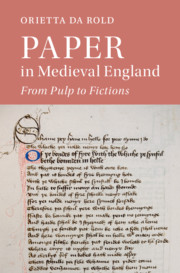Book contents
- Paper in Medieval England
- Cambridge Studies in Medieval Literature
- Paper in Medieval England
- Copyright page
- Dedication
- Contents
- Illustrations
- Figures
- Tables
- A Preface with Thanks
- Abbreviations and Conventions
- Paper and Culture in Medieval England
- Chapter 1 Paper Stories
- Chapter 2 The Economics of Paper
- Chapter 3 Writing on Paper
- Chapter 4 The Character of Paper and Its Use in Medieval Books
- Chapter 5 Paper in the Medieval Literary Imagination
- Chapter 6 Epilogue
- Appendix Paper Manuscripts in Cambridge University Library of English Provenance, datable up to s. xvex
- Bibliography
- Index of Manuscripts
- General Index
- Cambridge Studies in Medieval Literature
Chapter 3 - Writing on Paper
Tradition and Innovation
Published online by Cambridge University Press: 17 September 2020
- Paper in Medieval England
- Cambridge Studies in Medieval Literature
- Paper in Medieval England
- Copyright page
- Dedication
- Contents
- Illustrations
- Figures
- Tables
- A Preface with Thanks
- Abbreviations and Conventions
- Paper and Culture in Medieval England
- Chapter 1 Paper Stories
- Chapter 2 The Economics of Paper
- Chapter 3 Writing on Paper
- Chapter 4 The Character of Paper and Its Use in Medieval Books
- Chapter 5 Paper in the Medieval Literary Imagination
- Chapter 6 Epilogue
- Appendix Paper Manuscripts in Cambridge University Library of English Provenance, datable up to s. xvex
- Bibliography
- Index of Manuscripts
- General Index
- Cambridge Studies in Medieval Literature
Summary
Chapter 3 considers perceptions of and practices in writing on paper. The famous edict of Frederick II, declaring that paper was banned from his archives, is the initial occasion for this reflection. I then investigate the cultural significance of writing on paper and why paper was adopted in certain writing environments. Armando Petrucci’s proposition that a need to write rather than a need to read drives this process is explored in relation to his other suggestion—that the use of paper was never automatic but was always a choice, either voluntary or constrained by specific economic or social circumstances. The discussion then branches out into palaeographical considerations of cursivity, writing on paper and training. The chapter further considers the role of professional and non-professional hands in medieval literary culture. This reassessment suggests that it is difficult to maintain these boundaries in late medieval manuscript production, in particular for those books written on paper.
- Type
- Chapter
- Information
- Paper in Medieval EnglandFrom Pulp to Fictions, pp. 94 - 142Publisher: Cambridge University PressPrint publication year: 2020

